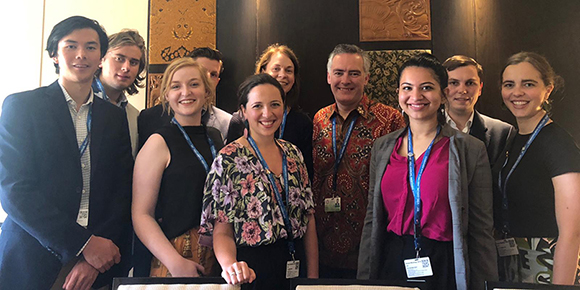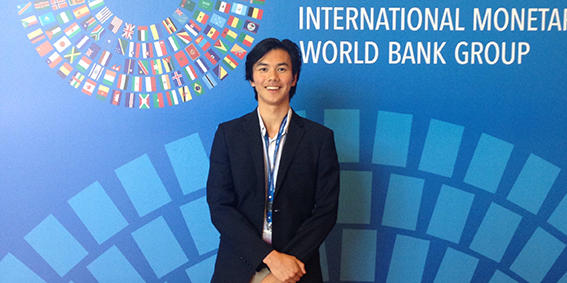The Meeting Point
By Seth Robinson
There is an interesting intersection between the worlds of business and government. Often, it’s the innovation of private industry that impacts public policy and offers solutions to problems in the public sphere. Bachelor of Commerce student James Chan spent a week exploring this meeting point when he travelled to the International Monetary Fund and World Bank meeting in Bali, as the University of Melbourne’s newest Global Voices scholar.
“I never expected how much I could get out of the week on both a professional and personal level. I can’t really over state it. As Global Voices scholars, we were exposed to world leaders and discovered the big economic issues facing the world.”

Within the Bachelor of Commerce, James is majoring in economics, however, the interplay between economics and the field of international relations is one of his greatest interests. When the opportunity to apply for the Global Voices program arose, it made sense for James to apply. Fast forward, and he’s become acutely aware of the economic issues that are playing out on the world stage.
Global Voices is a not-for-profit that provides the next generation of global leaders with practical experience in foreign policy and international relations; by supporting young people’s attendance at international summits including the United Nations, OECD, World Bank, IMF and G20.
“It’s actually quite hard to find out what the pressing issues that are being addressed by the multilateral system are, without being in a place like the IMF. The big thing for the week was the World Bank releasing the Human Capital Index. It’s a bit like the development index, except it focuses more on factors like education and healthcare, and how well a country invests in both areas.”
Each day, the conference focused on a key theme – which James documented in his blog, Youthful Reflections – issues like youth employment, tax justice, and the intersection of the public and private sectors in development.
“The most fascinating session that I attended was a panel on the Belt and Road Initiative which is a massive infrastructure project that extends to 71 neighbouring economies. There are lots of opportunities that can come from that as Chinese companies invest in infrastructure projects in low-middle income nations. Of course, there are pitfalls as well, for example, issues will arise if they’re encroaching too much on a country’s sovereignty.”
James makes the point that he doesn’t like the word “networking”, he thinks of his experience more as a chance to meet and express his interest to a variety of people, distinct from the traditional notion of building a professional network. In his time overseas, he connected with members of the Australian contingent, as well as delegations from countries such as Canada and New Zealand, and members of international institutions and NGOs.

“On the first day I was pretty nervous, being surrounded by central bankers and delegation representatives, but by the end of the week, I found I was able to strike up a conversation. A big part of that came from just approaching people who I was genuinely interested in speaking to. I found quite quickly that when you’re really interested in what someone has to say, they’re going to be very receptive to that.”
Now, James is thinking about the next step, and where his new, global facing perspective might take him. At this stage, he’s considering a deferral of his studies, so he can take advantage of some more international experience next semester.
“I met someone who works for a sustainable development network in Myanmar, as a result of connecting at the meetings last week. I find the idea of working in that space, in a country that is so politically complicated, utterly fascinating. I set up a meeting with him to find out more about his work. The network is run by a man named David Alan, an Australian who has lived in Myanmar for 13 years. The more I spoke to these two guys the more I thought ‘hey, I really want to work for you’, to even get an internship opportunity would be amazing. Now that’s in the works, so I hope to find out in a couple of months whether it will go ahead,” he says. “After the internship I would like to return to my studies. I like to think the experience will give me a greater perspective, and more of an angle. I think that’s something students often don’t think about when it comes to their studies. If they don’t have direction or an angle, or perspective, I think they can get lost amongst it all. I think this is a chance for me to go away and hone my passion, to zero in on what it is I want to achieve and develop the technical skills I need to do it. Once I’ve done that, who knows where life will take me.”